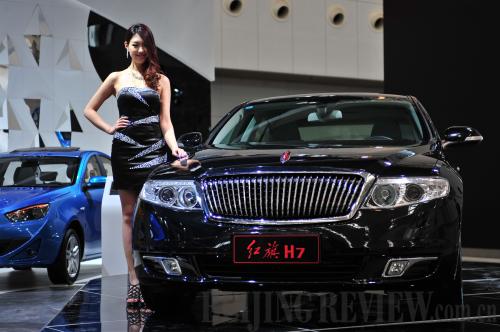|
 |
|
BRAND NEW: A Hongqi H7 model sedan is displayed at an international automotive industry exhibition at the Meijiang Convention and Exhibition Center in Tianjin on April 27 (ZHAI JIANLAN) |
Time-honored brand
First manufactured in 1958, Hongqi sedans ferried top state leaders like Mao Zedong and Deng Xiaoping to major celebrations, and even Richard Nixon rode in a Hongqi during his ice-breaking visit in 1972.
In those days, profitability was not a priority for a state-owned enterprise like FAW. It made the cars mainly for official use and operated at a loss.
The government ordered FAW to cease producing the brand in 1981 because of inefficiencies in production and fuel consumption. It had produced 1,540 sedans by then.
FAW tried to revive the tarnished brand in the 1990s by resuming production using foreign technology, but sales were poor and production ceased once again.
"Chinese people have a special attachment to the Hongqi brand because it carried China's automotive dreams in the early years of new China. The brand lost its market once already and cannot afford to lose it again," said Zhong Shi, an independent auto industry analyst in Beijing.
"Homegrown cars in China emerge almost every day. If Hongqi can successfully market its new H7 model as it has said, targeting officials above ministerial level and high-end users, it may see a turnaround," Zhong said.
Audi, Hongqi's major competitor which has dominated China's official car sector since 1996, reported that no more than 10 percent of its total sales come from government purchases. However, industry analysts say that Audi's image as an official car has driven sales to business leaders.
Cui with the China Passenger Car Association said that general sales of domestic auto brands could be boosted by the increase in government orders.
"In the past, people thought it would be a loss of face to drive a domestic car, but domestic brands will gradually have a bigger influence thanks to government support, and individual consumers will pay more attention to these brands," he noted.
However, Fu Zhiyong, Managing Director of Beijing-based ACME Management Consulting, spoke of his concern that the prospect for homegrown auto brands is still unclear, since they lag far behind foreign and joint-venture auto rivals in terms of design and technology.
Quality is the key to success and domestic automakers should not rely too much on government policies or purchases, he noted.
According to Zhang Pijie, General Manager of the FAW Car Co. Ltd., it was the lack of independent development capabilities that led to difficulties in FAW exploiting the market in the past.
This time, the Hongqi H7 is equipped with an independently developed engine, chassis and transmission, by using technologies developed under the Hongqi Revival Program, Zhang said, adding that FAW owns complete intellectual property rights for the vehicle.
FAW initiated the program in 2008 with a total investment of 5.2 billion yuan ($852 million). Its first Hongqi H7 car rolled off the assembly line on July 15, 2012.
According to the company's Hongqi brand development strategy, its H-series sedans compete with German luxury brands Audi and Mercedes-Benz. FAW introduced five models on May 30, and plans to gradually shift the marketing strategy to target individual consumers.
FAW will invest an additional 10.5 billion yuan ($1.71 billion) by 2015 to improve Hongqi's research and development capability and launch two SUV models, a multi-purpose vehicle for business use and a medium-sized limousine coach for ceremonies and parades.
"The company will also create more distribution channels to provide high-quality service for consumers," FAW's Board Chairman Xu Jianyi said.
Email us at: yinpumin@bjreview.com | 